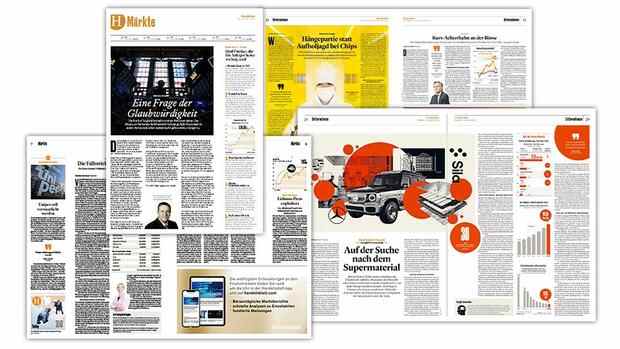Dusseldorf The Handelsblatt is renewed: Our e-paper and the printed edition appear with a refreshed layout and a new structure. In this way, we want to focus more on the economic issues that affect companies and politics most intensively and at the same time dovetail the print edition even better with our podcasts, newsletters and events.
In concrete terms, this means: the world is changing and shifting, we are changing and shifting our pages.
In view of global uncertainties, we are expanding our international reporting, which is expressed in the new structure right at the beginning of the newspaper, in the political section. Reports from our worldwide network of correspondents will be placed more prominently there in future. This gives more space to topics relating to geoeconomic developments in particular.
But it’s not just my colleagues from all over the world who report more extensively and in depth about the most important economic and technological developments in the most important foreign markets.
Top jobs of the day
Find the best jobs now and
be notified by email.
We are also significantly expanding our network of guest authors. The latest additions are the former ambassador and chairman of the Munich Security Conference, Wolfgang Ischinger, and security policy expert Claudia Major from the Stiftung Wissenschaft und Politik.
The latest additions are the former ambassador and ex-chairman of the Munich Security Conference, and the security policy expert Major from the Stiftung Wissenschaft und Politik.
We are also emphasizing our reports and analyzes on technological upheavals in our own columns and sections. Because the Handelsblatt wants to expand its position as an early indicator for the most important economic and technological developments.
The current geopolitical tensions are accompanied by countless breakthroughs and upheavals in companies all over the world. Because in uncertainty, a lot of new things emerge.
And we know from the past that many of the really big ideas emerge in the middle of the really big crises. LinkedIn was created shortly after the new economy crash, Google shortly before. Celonis, the most valuable start-up in Germany, was founded in the middle of the euro crisis in 2011.
In the Handelsblatt we will accompany and describe these major changes in industry and in small and medium-sized businesses and classify them in political, entrepreneurial and technological contexts.
We always want to introduce the people behind these changes. That’s why the portraits of the people in business, of the entrepreneurs and researchers, move forward from the magazine to the departments. Because business is made by people.
Reports on banks, insurance companies and real estate groups have always been part of the Handelsblatt’s DNA. From now on, they will move to the front of the corporate department. In the financial section, on the other hand, we concentrate even more on market events, financing trends, innovations and the monetary policy of the international central banks. After all, the turbulence on the international financial markets is more likely to increase than decrease. The numbers show that our readers are more interested in these topics than ever before.
Sebastian Matthes is Editor-in-Chief of the Handelsblatt.
At the end of the issue you will therefore find a significantly expanded section on developments on the international financial and commodity markets. There we examine market movements, analyze the most important charts – and explain how investors can navigate through the turbulent times.
I’m curious how you like our conversion. Write me your suggestions, criticism and also praise.
Yours Sebastian Matthes
Editor-in-Chief (Contact: [email protected])
